Celebrating 30 years of Ireland’s National Lottery
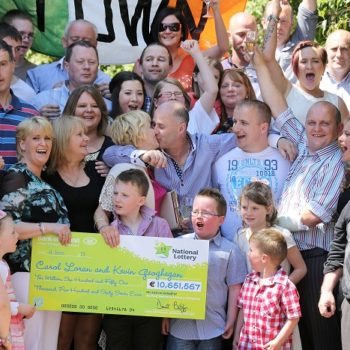
Naturally, numbers are what the National Lottery's games are all about, and during the past 30 years, the company has notched up more than a few impressive numbers itself. Specifically, since 1987 it has donated almost €5bn to good causes, and during 2016 alone it paid out some €45m to retailers in commission. As the company marks its 30th anniversary, GILLIAN HAMILL meets with senior executives Dermot Griffin, Michael Hayes and Niall Andrews to learn more about Premier Lotteries Ireland's plans for growth in the coming years...
15 March 2017
A heady atmosphere of possibility whizzes through the winners’ room at the National Lottery HQ. With plush, leather-studded walls and James Bond-esque panels that slide back to reveal champers on ice, it’s not surprising Premier Lotteries Ireland CEO Dermot Griffin says the feel good factor that abounds here when he hands over a major cheque is his favourite part of the job. Indeed, 56c in every euro on National Lottery games goes towards prizes with 29 cents heading to good causes, while the Lottery’s retail partners earn more than 6c from every euro spent; this leaves 9c from each euro to run the National Lottery. An impressive feat, considering the company is one of the top ten advertisers in Ireland and accuracy within its systems is absolutely imperative.
It is a slickly run, highly efficient operation and as a result, as the National Lottery marks its thirtieth anniversary in 2017, it has a huge amount to celebrate. Not least, the contribution it has made to Irish society over the past three decades.
Good causes and prizes
Since the Lottery began in 1987, almost €5 billion has been raised for deserving organisations in communities across Ireland. Major infrastructural projects have benefitted from its funding including Croke Park, the National Children’s Hospital and the development of the Wild Atlantic Way. And in terms of bringing excitement to your customers’ everyday lives, ShelfLife is hard-pressed to think of any FMCG company that has contributed more in this regard. Since 1987, the National Lottery has paid out in excess of 800 prizes with a value of more than €1 million; between €1million and a staggering €115 million in fact.
“It really is a nice part of the job to be able to hand over a cheque that changes people’s lives and anyone that’s been through it, I think you can’t but help feel part of that win,” Dermot Griffin tells us. “There are a lot of people where one day they’re struggling with their bills and have overdrafts or might be behind on their mortgage, and suddenly, that weight is gone and they have financial security.”
Indeed, giving people the chance to win life-changing amounts of money is the Lottery’s raison d’être. The organisation is also understandably proud of the benefits it has delivered for indigenous Irish retailers. Approximately €45 million, 6.1% of sales, was paid to retailers in commission on sales in 2016. A neat demonstration of the extent the Lottery is growing to the benefit of its retail network.
A network which the business stresses is a crucial part of its ambitions to grow and maintain the National Lottery into the future (more on that later).
Delivering such high benefits for the Lottery’s retail partners, players, and good causes, certainly does not come easily though; operational excellence is demanded. “Our business is non-stop and we have to ensure that the integrity of our business is core to what we do,” says Griffin. “We have to ensure that our systems operate with 100% accuracy, so that every ticket that’s purchased is in the draw, and all the draws are carried out to the highest standards.
“Operationally,” he continues, “we’re dealing with hundreds of millions of transactions and our systems must be 100% accurate, with all results displayed accurately. That takes an awful lot of effort, by our teams who work continually, to ensure that the controls and systems in the business are fool-proof,” he adds.
Transition to PLI
Understandably, the successful transition of the Lottery’s transition to a new licence, namely Premier Lotteries Ireland (PLI), in 2014, is subsequently the achievement Griffin says he is most proud of throughout his career. He started out at KPMG, where he qualified as a member of the Chartered Association of Certified Accountants. His next move involved him working with Eircom for three years in corporate accounting, before moving to Vodafone for a 12-year stretch.
At Vodafone Ireland, Griffin advanced to the position of commercial director, leading sales and distribution activities, having previously held the roles of business development director and finance director. An impressive CV no doubt, which also sees Griffin hold a Bachelor of Commerce degree.
Back to the Lottery’s transition however and Griffin describes the move to the new licence as “certainly the biggest project that I’d been involved in; the scale of it was enormous. The amount of planning that had to go in to make it happen was incredible,” he says. “To be able to run a Lotto game, on a Saturday evening, take in 500,000 tickets and have the draw, and then the next day switch over to a totally new system, and be able to conduct the draw that evening and have everything balance to the last cent on both days, that was a magnificent achievement.” He adds that it was a “collective effort”, achieved over a period of nine months, where everyone got behind them, “including the retail community to make it happen.
“There were a number of months when we had to bed things in and there were some things that we had to iron out,” Griffin concedes. However, “the scale of the transition was enormous” and the CEO believes that its success was truly cemented last year; “the first year that we were able to roll out our new business developments. I think it’s only when you look back at it, that you can see the scale of the success of that transition,” Griffin says.
Support of retail agents
The support of the Lottery’s retail network continues to be a vital ingredient in its continued growth. Bearing this in mind, Griffin stresses the extent to which the Lottery makes sure it takes the time to develop close working relationships with its retailers and listen to their feedback. “I and the rest of the operations board, as part of our objectives
every year, spend time out in the field, visiting retailers. For example, before Christmas,
I was down in Arklow town, with one of the field sales representatives, really talking to retailers and getting their view on what we’re doing well and what we can improve on. We were also talking to customers in-store and that’s something that we all do on the executive team and that information is invaluable in running the business.” He continues on this theme with some more straight-talking words, noting: “We can come up with great games and initiatives here but if they don’t sell in the store, it’s not worth doing.”
Indeed, the importance of getting out there on to the field is something Griffin learnt early on in his career from a memorable, and indeed, inspirational character. “One thing that stands out for me is when I started out in KPMG and one of my first clients was Ballygowan Spring Water,” he recalls. “There was a guy there called Jeff Reid who headed up spring water and he literally started it from scratch.” In fact, the bottled water category was still at a nascent stage, with Perrier the only significant rival on the scene. Griffin was impressed by Reid’s dedication and resourceful marketing techniques. “He would literally go out on a marathon day and stand behind the camera as they’re interviewing people; handing out bottles of spring water.” What’s more, on Sundays, he would go to the supermarkets that were open. “If they didn’t have Ballygowan, he’d go up to the manager and say, ‘Do you have Ballygowan Spring Water?’ They would say no, and he’d go, ‘Oh it’s lovely, I tasted it somewhere’ and they’d say they would put in an order for it. The next day he’d be at the receiving end of the phone to take the order from his own request! He never stopped; he just kept going and continued to market his product, even with pretty much no budget.” The valuable lesson Griffin learnt from this dogged determination was thus: “It struck me that you don’t wait for things to happen, you try and make them happen.”
Of course, in an always-on business, we were keen to hear how the CEO destresses after a busy week. “On a Saturday morning, I normally go out and stress on the golf course, so it’s a different type of stress,” he jokes, “but it certainly takes your mind off the business! I have four children so there’s no problem with distractions every evening or every weekend!” That said, during the Lottery draws – on Tuesday, Wednesday, Friday and Saturday – turning his phone off is not an option. “I’ve often run out of the cinema on a Saturday evening to answer the phone to somebody saying ‘I just want to run this past you’, or we’ve been on calls at 3am in the morning because other countries can’t balance on Euromillions. You always have to be available.” Nevertheless, the advantage of being in a long-running organisation like the National Lottery, says Griffin, is that it benefits from a hive of “experienced individuals, who have been in it from the start and have in effect, built up the business. We can therefore always tap into the knowledge that’s built up in our people.”
Capitalising on this wealth of experience, Griffin says of the Lottery’s ambitions for 2017: “We want to bring more people into our games. Our number one goal is to bring the National Lottery to a new generation of players. We will continue to grow the business, building on our initiatives of previous years. Naturally on distribution, we want to make it as convenient for players as possible, in-store and online.”
Continuing on the theme of his team’s objectives, Griffin adds: “The important thing for us is to stress the Irish-ness of the National Lottery. While we have new shareholders, the management and operation of the National Lottery is the same; predominantly it’s important that people understand that. We also need to ensure that people understand the prizes are actually increasing. We need to build that awareness so that people understand the level of prizes that we are giving out every day is in excess of €1 million, and that large sums from the National Lottery are continually going to good causes.”
Support of retail agents
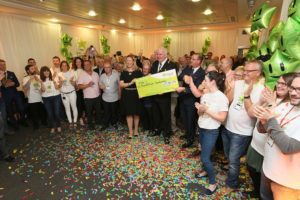 The support of the Lottery’s retail network continues to be a vital ingredient in its continued growth. Bearing this in mind, Griffin stresses the extent to which the Lottery makes sure it takes the time to develop close working relationships with its retailers and listen to their feedback. “I and the rest of the operations board, as part of our objectives every year, spend time out in the field, visiting retailers.
The support of the Lottery’s retail network continues to be a vital ingredient in its continued growth. Bearing this in mind, Griffin stresses the extent to which the Lottery makes sure it takes the time to develop close working relationships with its retailers and listen to their feedback. “I and the rest of the operations board, as part of our objectives every year, spend time out in the field, visiting retailers.
“For example,” he continues, “before Christmas I was down in Arklow town, with one of the field sales representatives, really talking to retailers and getting their view on what we’re doing well and what we can improve on. We were also talking to customers in-store and that’s something that we all do on the executive team and that information is invaluable in running the business.” He continues on this theme with some more straight-talking words, noting: “We can come up with great games and initiatives here but if they don’t sell in the store, it’s not worth doing.”
Indeed, the importance of getting out there on to the field is something Griffin learnt early on in his career from a memorable, and indeed, inspirational character. “One thing that stands out for me is when I started out in KPMG and one of my first clients was Ballygowan Spring Water,” he recalls. “There was a guy there called Jeff Reid who headed up spring water and he literally started it from scratch.” In fact, the bottled water category was still at a nascent stage, with Perrier the only significant rival on the scene. Griffin was impressed by Reid’s dedication and resourceful marketing techniques. “He would literally go out on a marathon day and stand behind the camera as they’re interviewing people; handing out bottles of spring water.” What’s more, on Sundays, he would go to the supermarkets that were open. “If they didn’t have Ballygowan, he’d go up to the manager and say, ‘Do you have Ballygowan Spring Water?’ They would say no, and he’d go, ‘Oh it’s lovely, I tasted it somewhere’ and they’d say they would put in an order for it. The next day he’d be at the receiving end of the phone to take the order from his own request! He never stopped; he just kept going and continued to market his product, even with pretty much no budget.” The valuable lesson Griffin learnt from this dogged determination was thus: “It struck me that you don’t wait for things to happen, you try and make them happen.”
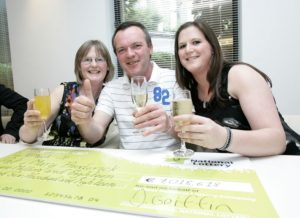 Of course, in an always-on business, we were keen to hear how the CEO destresses after a busy week. “On a Saturday morning, I normally go out and stress on the golf course, so it’s a different type of stress,” he jokes, “but it certainly takes your mind off the business! I have four children so there’s no problem with distractions every evening or every weekend!” That said, during the Lottery draws – on Tuesday, Wednesday, Friday and Saturday – turning his phone off is not an option. “I’ve often run out of the cinema on a Saturday evening to answer the phone to somebody saying ‘I just want to run this past you’, or we’ve been on calls at 3am in the morning because other countries can’t balance on Euromillions. You always have to be available.” Nevertheless, the advantage of being in a long-running organisation like the National Lottery, says Griffin, is that it benefits from a hive of “experienced individuals, who have been in it from the start and have in effect, built up the business. We can therefore always tap into the knowledge that’s built up in our people.”
Of course, in an always-on business, we were keen to hear how the CEO destresses after a busy week. “On a Saturday morning, I normally go out and stress on the golf course, so it’s a different type of stress,” he jokes, “but it certainly takes your mind off the business! I have four children so there’s no problem with distractions every evening or every weekend!” That said, during the Lottery draws – on Tuesday, Wednesday, Friday and Saturday – turning his phone off is not an option. “I’ve often run out of the cinema on a Saturday evening to answer the phone to somebody saying ‘I just want to run this past you’, or we’ve been on calls at 3am in the morning because other countries can’t balance on Euromillions. You always have to be available.” Nevertheless, the advantage of being in a long-running organisation like the National Lottery, says Griffin, is that it benefits from a hive of “experienced individuals, who have been in it from the start and have in effect, built up the business. We can therefore always tap into the knowledge that’s built up in our people.”
Capitalising on this wealth of experience, Griffin says of the Lottery’s ambitions for 2017: “We want to bring more people into our games. Our number one goal is to bring the National Lottery to a new generation of players. We will continue to grow the business, building on our initiatives of previous years. Naturally on distribution, we want to make it as convenient for players as possible, in-store and online.”
Continuing on the theme of his team’s objectives, Griffin adds: “The important thing for us is to stress the Irish-ness of the National Lottery. While we have new shareholders, the management and operation of the National Lottery is the same; predominantly it’s important that people understand that. We also need to ensure that people understand the prizes are actually increasing. We need to build that awareness so that people understand the level of prizes that we are giving out every day is in excess of €1 million, and that large sums from the National Lottery are continually going to good causes.”
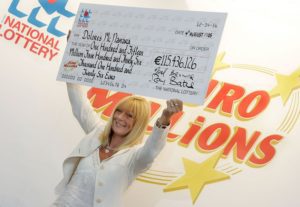
The new marketing strategy driving brand awareness
At this point, our conversation segues nicely into how Michael Hayes, head of marketing, intends to grow brand awareness and attract new players.
Before outlining this strategy in greater detail however, it is fitting to give a quick overview of Hayes’ career to date. Having graduated from UCD in 1985 with a B.Comm and MBS in Marketing under his belt, Hayes joined Irish Biscuits Ltd on Dublin’s Belgard Road as assistant brand manager working on a portfolio of leading biscuit brands (Jacob’s Kimberly, Mikado, Fig Rolls, Club Milk countlines and Boland’s); remember those! In 1987 he joined the Diageo Group where he spent the next 14 years learning his craft and was schooled in the “Diageo Way of Brand Building,” acquiring blue chip skills and experience on the art & science of brand building, brand communications, brand strategy, shopper insight development and effective agency management. He progressed quickly through the ranks and gained experience across all three business units starting in International Brand Management with the Baileys Brand, and was promoted through the ranks to become its marketing director for Europe (EMEA) in 1990.
In 1995 he moved from international markets to the national marketing division of Diageo Ireland at Gilbey’s of Ireland as its marketing director where he successfully led a marketing team of 12 with responsibility for a leading portfolio of wine and spirit brands such as Smirnoff, Baileys, Johnnie Walker, Archers, and Malibu to name but a few. While there he led the team that successfully launched Smirnoff Ice RTD into Ireland and took the Smirnoff Vodka brand to new heights in terms of sales and market share. In 2000 he took the opportunity to live and work abroad with Diageo USA taking up the role as marketing director for its Pillsbury Foods division based in Minneapolis and broadened his marketing skills from drinks into the faster paced branded food and grocery sector.
Since returning to Ireland in late 2003, Hayes continued to broaden his marketing career by working in various senior marketing roles with blue chip companies and brands such as DCC Foods, Meteor Mobile, and the Musgrave Group. Having gained valuable retail marketing experience while at the Musgrave Group, Hayes then joined Premier Lotteries Ireland as head of marketing in November 2016. When not thinking about the next best way to raise funds for good causes by promoting the National Lottery games, Hayes is busy supporting his three boys who are all keen GAA fans and players with local southside GAA club Kilmacud Crokes, and of course cheering on his favorite boys in blue, Dublin…COYBIB!
Player-centric approach
While he has therefore only been with the National Lottery for a relatively short-time, Hayes has already hit his stride. Crucially, the company takes a player-centric approach to marketing, seeking to make the games as accessible as possible for its players so that it fits into their modern lifestyles. The idea behind this is that many people wager a small amount of money, making the National Lottery the national game that everyone can take part in and enjoy, especially when the jackpot grows. Hayes is keen to stress that player protection is considered paramount and that this is what lies at the heart of all promotional activities. There has also been an increased investment ploughed into promotion, with major advertising campaigns coming on-stream, to generate excitement and stimulate play.
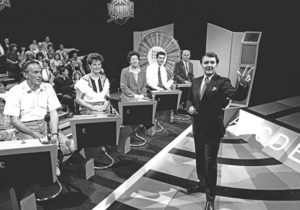 Given that a key part of creating this excitement lies in the development of engaging online games, we were keen to hear how the National Lottery balances the emphasis it places on both its online strategy and traditional in-store sales. “For us it’s a question of balance,” Hayes replies. “In total, over 90% of our sales go through the retail network. I’m still relatively new to our business, and I’ve been very impressed with the amount of innovation that’s going on within the retail channel. While for a lot of people, it is trendy and popular to talk about online, there’s also fantastic digital and technological innovation happening with our business in-store and that’s driving our retail business. But from a marketing point of view, increasing our advertising investment is about driving that pull-through in the retail network. Plus, we make a significant investment from ur marketing monies in driving the point
Given that a key part of creating this excitement lies in the development of engaging online games, we were keen to hear how the National Lottery balances the emphasis it places on both its online strategy and traditional in-store sales. “For us it’s a question of balance,” Hayes replies. “In total, over 90% of our sales go through the retail network. I’m still relatively new to our business, and I’ve been very impressed with the amount of innovation that’s going on within the retail channel. While for a lot of people, it is trendy and popular to talk about online, there’s also fantastic digital and technological innovation happening with our business in-store and that’s driving our retail business. But from a marketing point of view, increasing our advertising investment is about driving that pull-through in the retail network. Plus, we make a significant investment from ur marketing monies in driving the point
of sale materials, so all of that investment is fundamental to activating impulse purchases in the retail environment. It’s therefore definitely not a case of neglecting retail; it is still our number one channel.”
Of course, advertising plays a huge part in driving those in-store sales and we were eager to pick Hayes’ brains about how the National Lottery manages to create campaigns with such a strong call to action. He explains that each game has its own individual brand personality which fits within the overall National Lottery framework. For example, with the EuroMillions draw, making the brand more accessible was the key challenge. “People felt, ‘Oh EuroMillions, it’s not really Irish’,” he says, “so we had to kind of coat it in a more Irish sense of humour and language through ‘the Island advertising campaign’. The Lottery is one of the few brands that is centred around a life-changing experience for our players; that’s the whole dream behind the ‘What if?’ or ‘It could be you!’ ads. We try to create that emotional connection through our advertising and we would copy-test our advertising to make sure it has that. We also have an advantage here in that Irish people have historically been quite superstitious so you can build on that and the Irish sense of humour and leverage those specific Irish insights into what drives our player behaviour.”
Life-changing wins
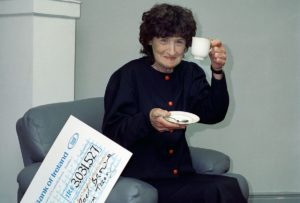 Naturally, big wins help drive excitement; and emphasise the extent to which the National Lottery truly can bring life-changing experiences. Indeed, in the last 12 months, Ireland has experienced an unprecedented three Euromillions jackpot wins including a €66 million bought in Carlow; a syndicate of bus drivers from Dublin who won €23 million; and most recently a work syndicate from Dublin who won €88.5 million last month. In 2016, over 200 players won over €100,000 on National Lottery draw based games.
Naturally, big wins help drive excitement; and emphasise the extent to which the National Lottery truly can bring life-changing experiences. Indeed, in the last 12 months, Ireland has experienced an unprecedented three Euromillions jackpot wins including a €66 million bought in Carlow; a syndicate of bus drivers from Dublin who won €23 million; and most recently a work syndicate from Dublin who won €88.5 million last month. In 2016, over 200 players won over €100,000 on National Lottery draw based games.
The company’s flagship Lotto game is delivering in a big way for Irish players too with a family from Mayo winning nearly €14 million in January 2016 with 11 jackpot winners in 2016. What’s more, a total of around €400 million, more than €1million each day – was given out in prizes to National Lottery players in 2016, creating winners up and down the country. Game developments have played an important role in this winning story, with improvements to EuroMillions, Lotto and add-on games driving footfall and sales – unsurprisingly players respond well to bigger jackpots and better prizes!
Media attention at Applegreen Lusk
This was evident in the frenzy of media activity which surrounded the latest €88.5 million winning EuroMillions ticket sold in Applegreen Lusk in Co. Dublin. It appeared the entire country was consumed by speculation as to who could have been lucky enough to scoop the mega-jackpot at one point, with rumours abounding that it had been won by a syndicate in Cork. The service station cleverly capitalised on this attention by cutting the price of petrol and diesel to 88.5 cent per litre, a move greeted by queues of motorists eager to snap up the bargain.
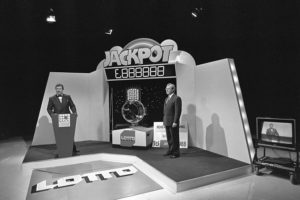 Michael Hayes and Niall Andrews, head of sales and operations, filled us in on the backstory behind this attention-grabbing discount. “It was actually an idea that Niall came up with and it speaks back to the importance of our retail network and our retail partners,” says Hayes. “As soon as we knew where the winning prize was won, Niall got in touch with Applegreen as a key retail partner and said we think there’s an opportunity to amplify the message. It literally happened in 24 hours and we had to keep it under wraps, otherwise you’d have the media jumping the gun and it had already reached fever pitch, with people thinking it was won down in Cork even though it hadn’t been.”
Michael Hayes and Niall Andrews, head of sales and operations, filled us in on the backstory behind this attention-grabbing discount. “It was actually an idea that Niall came up with and it speaks back to the importance of our retail network and our retail partners,” says Hayes. “As soon as we knew where the winning prize was won, Niall got in touch with Applegreen as a key retail partner and said we think there’s an opportunity to amplify the message. It literally happened in 24 hours and we had to keep it under wraps, otherwise you’d have the media jumping the gun and it had already reached fever pitch, with people thinking it was won down in Cork even though it hadn’t been.”
After taking Applegreen’s Joe Barrett into their confidence, Applegreen’s marketing team “really stepped up to the plate” and delivered the winning idea, alongside the follow-up tagline of ‘88.5 million reasons to visit Applegreen’.
Indeed, a win of this magnitude doesn’t just create excitement with the media which is quite unique,” says Hayes, “it also generates excitement within our retailer network because they’re all on a buzz, asking ‘who’s won it?’ The whole network gets excited.” Creative thinking of this nature, in collaboration with retail partners such as Applegreen, is becomingly increasingly important. “From a PR and marketing perspective, when you have large amounts of prizes that are won, it’s not uncommon that the winners want to stay anonymous so we have to find cleverer, imaginative ways to bring that excitement to life and remind the public that winning does happen and it’s a great thing when it does.”
Driving sales in-store
Indeed, winning certainly does happen but it all starts with those all-important ticket and scratch card sales! On this note, we discuss the National Lottery’s growth strategy with Niall Andrews, head of sales and operations. Another experienced hand within the business, Andrews started his career with Cadbury Ireland in 1996 where he had progressed to head of sales by 2006. Kraft acquired Cadbury in 2010 and appointed Niall as sales director for Kraft Foods in Ireland and subsequently Mondelez International in 2013. During his time at Kraft Foods, Andrews completed a Master’s in Business Administration (MBA) in July 2010. His next move saw Andrews join PLI in May 2015, where he enjoys the level of interaction with retailers his post enables him to have.
Most profitable two feet of linear space
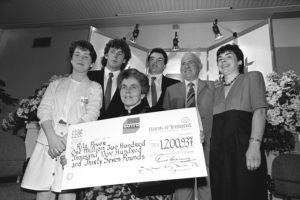 “Our retail network is a crucial part of our ambitions to grow and maintain the national Lottery into the future,” says Andrews. “In recent times we have invested heavily to make sure that retailers have the knowledge and assets at their disposal to capitalise on what is the most profitable two feet of linear space in their store.”
“Our retail network is a crucial part of our ambitions to grow and maintain the national Lottery into the future,” says Andrews. “In recent times we have invested heavily to make sure that retailers have the knowledge and assets at their disposal to capitalise on what is the most profitable two feet of linear space in their store.”
The National Lottery’s retail strategy concentrates on three pillars. The first of these is ‘Excellence in Retail’, in which the Lottery has a close affiliation with ShelfLife’s annual C-Store Awards. “The Excellence in Retail programme concentrates on how the products are displayed in the store and we have a marketing criteria to reward stores on this on an annual basis, with recognition at ShelfLife’s Awards.” The Lottery’s dedicated sales team is committed to implementing this programme, known as Star Store, with the Star Mark used to measure retailing excellence standards in-store.
“The second pillar we have then is new points of distribution,” Andrews continues. “What we have done over 2016 is we have built a platform where we can integrate into our customers’ network and a good example of that would be An Post where last October we increased our distribution points by 1,125 by integrating into all post offices in the country. We’re also working with Payzone and PostPoint which will make National Lottery products available to stores that wouldn’t have had our products before and that is one of our big plays for 2017.
Retail optimisation
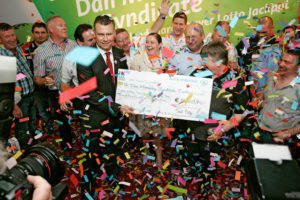 “And then the third part of our retail strategy is optimisation of our existing retailers,” says Andrews, “working with retailers that have multiple points of purchase across the store. An example of that would be a SuperValu, where traditionally we would be sold in the kiosk area.” Andrews explains that the Lottery is working closely with retailers to expand these points of distribution, for example with self-serve products.
“And then the third part of our retail strategy is optimisation of our existing retailers,” says Andrews, “working with retailers that have multiple points of purchase across the store. An example of that would be a SuperValu, where traditionally we would be sold in the kiosk area.” Andrews explains that the Lottery is working closely with retailers to expand these points of distribution, for example with self-serve products.
That said, ‘responsible play’ remains a fundamental tenant of the Lottery’s ethos.
“The National Lottery takes its player protection responsibilities very seriously, with particular regard to those in society who are vulnerable and those who are underage,” says Andrews. Every game is subject to approval by the National Lottery Regulator, and the National Lottery is also an accredited member of the World Lottery Association. What’s more, it encourages all customers to follow measures such as only playing an amount that they can afford, and keeping track online of the time and the amount of money they are spending through the player history function. “Responsible play is in the heart of everything that we do,” Andrews emphasises. “It’s central in the building of our new online retailer portal which includes a training centre. Currently we train our retail agents but what we want to do is make sure that they have the tools to train their staff. We’re hoping to go live with the retailer portal at the end of April. We are enhancing our current processes to make sure that information is readily available to our customers.”
Major investment
Andrews also stresses that listening to retailers and customers is absolutely essential to the success of the Lottery’s operation. “I can honestly say from being in the FMCG business for over 20 years, there is nobody investing in our customers like the National Lottery is. We’re working with all our major retail customers, independent accounts, and very closely with the CSNA and RGDATA, to make sure that our distribution and our products are supported across the full network.” Digital developments are certainly not limited to the online realm, moreover. “It’s really, really important to get that message out, that the National Lottery sees that the digital plan will also have a retail focus in the future. We’re investing millions in making sure that we have that technology,” he says.
Specifically, the National Lottery is investing in a number of key areas to make the operations and customer interaction for its players and agents easier. By investing in automatic ordering technology (SUGO); new prominent counter units and customer relationship management software, Andrews says the company is “ensuring that we are delivering a modern world-class lottery not just for the people of Ireland but for our agents as well.” And giving his verdict on the new ordering system, he says: “Instead of having a traditional telesales function, this is a state-of-the-art predictive ordering system,” which will help make it easy for retailers to stay well-stocked.
Agent council
Knowing what retailers want and need is greatly aided by the fact the Lottery holds an ‘agent council’. “We meet three to four times a year, and we have representatives from all the key retailer groups, such as the CSNA and RGDATA,” Andrews explains. “We would normally have ten people at each meeting, with members who are influential within the trade. For example, Seamus Griffin, who has around 20 stores across Dublin with the Londis brand. Seamus hasn’t missed one and he’s been very proactive in driving the retailer agenda through that council.”
Explaining more about the merits of having the agent council, Andrews says: “It’s a great committee because if we have an idea, we can bounce it off the retailers. We share what we’re doing on our digital platform, and our plans for extending our network. Anyone who comes into the room, comes in with a business hat on them, they understand that the National Lottery is one of the biggest brands in Ireland. The really important thing is the scale of retail commission; retailers received €45 million last year in commission from the National Lottery. That Lottery commission equals the entire sales value of the chewing gum market so it’s a massive amount of money and retailers understand that, which is why the agent council is really important to us.”
Delivering on promise and vision
With these developments and efficiencies advancing, the National Lottery is in a highly positive place as it celebrates its milestone 30th anniversary. Having emerged from the difficult trading environment experienced by everyone in Ireland during the recessionary years; and having completed the major and necessary upgrades of transition, the largest technical deployment in Irish FMCG history, all aspects of the business have now returned to growth. Under the stewardship of PLI, the National Lottery is extremely well-positioned to deliver on its promise and vision for a modern and sustainable Lottery for the people of Ireland. One that will continue to generate vital funds for good causes and provide the fun and excitement of playing for a life-changing amount of money. n



 Print
Print


Fans 0
Followers